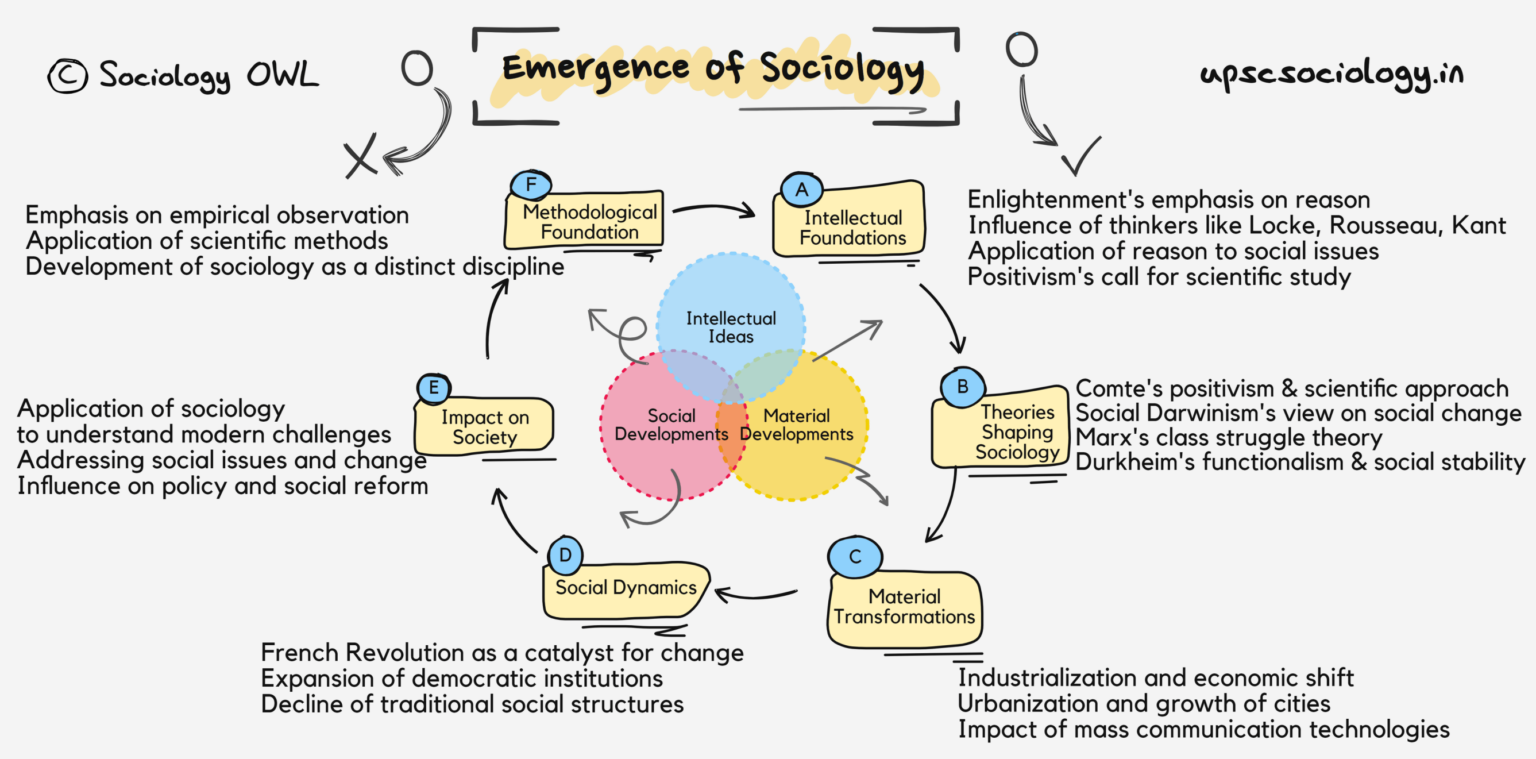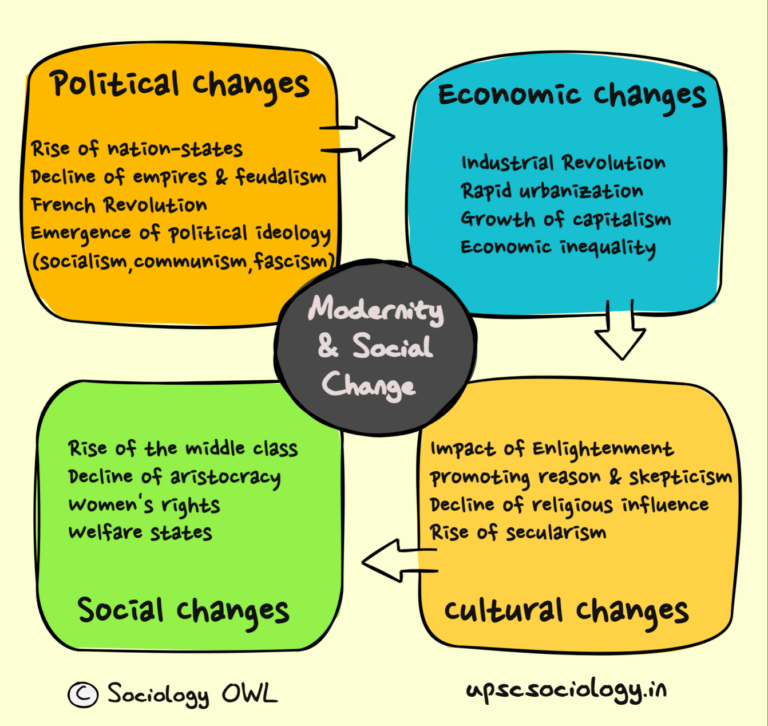Sociology, the scientific study of human society, social relationships, interactions, and culture, emerged as a distinct academic discipline in the early 19th century. Its development was a response to the profound social changes brought about by modernity, including rapid industrialization, urbanization, and the erosion of traditional social structures. The emergence and evolution of sociology can be attributed to a complex interplay of intellectual ideas, material developments, and social transformations. This article provides an in-depth exploration of the history of sociology, the key intellectual ideas that shaped its foundation, and the material and social developments that influenced its growth and direction.
I. Intellectual Ideas that Lead Emergence of Sociology
A. The Enlightenment
The Enlightenment, a period of intellectual and philosophical development in Europe during the 17th and 18th centuries, laid the groundwork for the emergence of sociology. This era was characterized by:
1. A belief in reason and rationality as the primary means of understanding the world.
2. The idea that human beings have the power to comprehend and improve their social conditions.
3. An emphasis on empirical observation and scientific methods.
Key Enlightenment thinkers who contributed to the development of sociological thought include:
– John Locke (1632-1704): Emphasized the importance of individual rights and the social contract.
– Jean-Jacques Rousseau (1712-1778): Explored the relationship between the individual and society, introducing concepts like the “general will.”
– Immanuel Kant (1724-1804): Developed ideas about the nature of knowledge and ethics that influenced later sociological thinking.
– Montesquieu (1689-1755): Studied the relationship between social institutions and government, introducing early comparative methods.
The Enlightenment’s legacy in sociology includes:
– The belief that social phenomena can be studied scientifically.
– The idea that social problems can be solved through the application of reason and empirical research.
– A focus on progress and social improvement.
B. Positivism
Positivism, a philosophical approach emphasizing empirical observation and scientific methods, played a crucial role in establishing sociology as a distinct discipline. Key aspects include:
1. Auguste Comte (1798-1857): Often considered the father of sociology, Comte:
– Coined the term “sociology” in 1838.
– Developed the idea of sociology as the “queen of sciences,” the culmination of human knowledge.
– Proposed the “law of three stages,” suggesting that human thought progresses from theological to metaphysical to positive (scientific) stages.
2. Methodological contributions:
– Emphasis on empirical data collection and analysis.
– The belief that social phenomena can be studied objectively, like natural phenomena.
– The idea that sociological knowledge can be used to improve society.
3. Influence on early sociological research:
– Encouraged the use of statistical methods in social research.
– Promoted the idea of value-free social science.
C. Social Darwinism
Social Darwinism played a significant role in early sociological thought:
1. Herbert Spencer (1820-1903):
– Popularized the application of evolutionary principles to social development.
– Coined the phrase “survival of the fittest” and applied it to social competition.
2. Key ideas:
– Societies evolve through competition and adaptation.
– Social inequality is a natural result of this evolutionary process.
– Government intervention in social issues is counterproductive to social progress.
3. Impact on sociology:
– Highlighted the importance of studying social change and evolution.
– Influenced early theories of social stratification.
– Sparked debates about the role of nature versus nurture in social development.
4. Criticisms and legacy:
– Used to justify social inequality, racism, and imperialism.
– Led to the development of more nuanced theories of social evolution.
– Contributed to ongoing debates about biological determinism in social science.
D. Marxism
Marxism, developed by Karl Marx (1818-1883) and Friedrich Engels (1820-1895), had a profound impact on sociological theory:
1. Key concepts:
– Historical materialism: The idea that economic systems shape social structures and ideologies.
– Class struggle: The notion that conflict between social classes drives historical change.
– Alienation: The separation of workers from the products of their labor and their human nature.
2. Contributions to sociology:
– Provided a framework for understanding social inequality and power dynamics.
– Emphasized the role of economic factors in shaping society.
– Introduced conflict theory as a major perspective in sociology.
3. Influence on sociological research:
– Inspired studies on social stratification and inequality.
– Influenced the development of critical theory and feminist theory.
– Contributed to the emergence of economic sociology.
E. Functionalism
Functionalism, primarily developed by Emile Durkheim (1858-1917), offered a different perspective on social order:
1. Key ideas:
– Society is a complex system of interdependent parts.
– Social institutions serve specific functions to maintain social stability.
– Social cohesion is maintained through shared values and norms.
2. Emile Durkheim’s contributions:
– Established sociology as an academic discipline in France.
– Developed the concept of social facts.
– Conducted groundbreaking research on suicide, demonstrating the impact of social integration on individual behavior.
3. Impact on sociology:
– Provided a framework for studying social stability and integration.
– Influenced the development of systems theory in sociology.
– Contributed to the study of social institutions and their roles in society.
F. Symbolic Interactionism
Symbolic interactionism, developed by George Herbert Mead (1863-1931) and later articulated by Herbert Blumer (1900-1987), added another important perspective:
1. Key concepts:
– Human beings act toward things based on the meanings they ascribe to them.
– Meaning arises from social interaction.
– Meanings are modified through an interpretative process.
2. Contributions to sociology:
– Focused attention on micro-level social interactions.
– Emphasized the role of symbols and language in social life.
– Influenced the development of qualitative research methods in sociology.
II. Material Developments / Historical Antecedents that Influenced Sociology
A. Industrialization
The Industrial Revolution, which began in Britain in the late 18th century, had a profound impact on the development of sociology:
1. Economic changes:
– Shift from agrarian to industrial economies.
– Rise of factory systems and mass production.
– Emergence of new social classes (industrial bourgeoisie and proletariat).
2. Technological advancements:
– Steam power and mechanization.
– Improvements in transportation (railways, steamships).
– New communication technologies (telegraph).
3. Impact on sociology:
– Created new social problems that demanded study and solutions.
– Led to research on labor conditions, social mobility, and economic inequality.
– Inspired theories about the relationship between technological change and social structure.
B. Urbanization
The rapid growth of cities during the Industrial Revolution created new social environments and challenges:
1. Demographic shifts:
– Mass migration from rural to urban areas.
– Formation of large, diverse urban populations.
2. Social issues:
– Overcrowding and poor living conditions.
– Poverty and income inequality.
– Crime and social disorganization.
3. Contributions to sociology:
– Inspired the development of urban sociology.
– Led to studies on community, social networks, and social isolation.
– Influenced theories about the impact of physical environment on social behavior.
C. The Rise of Mass Communication
The development of mass communication technologies had significant implications for social life and sociological research:
1. Key developments:
– Widespread literacy and the growth of print media.
– Invention of radio and later television.
– Emergence of mass advertising and consumer culture.
2. Impact on society:
– Increased access to information and ideas.
– Formation of public opinion on a larger scale.
– Development of mass culture and popular entertainment.
3. Influence on sociology:
– Facilitated the collection and dissemination of social data.
– Led to studies on media effects, public opinion, and mass culture.
– Contributed to the development of communication studies as a related field.
III. Social Developments that Shaped Sociology
A. The French Revolution
The French Revolution (1789-1799) had a profound impact on social and political thought:
1. Key events and ideas:
– Overthrow of the monarchy and feudal system.
– Declaration of the Rights of Man and of the Citizen.
– Rise of nationalism and modern citizenship.
2. Impact on sociology:
– Demonstrated the power of collective action in social change.
– Inspired studies on revolution, social movements, and political sociology.
– Contributed to theories about the relationship between social structure and political systems.
B. The Growth of Democracy
The expansion of democratic institutions in the 19th and early 20th centuries influenced sociological thought:
1. Key developments:
– Expansion of suffrage rights.
– Formation of political parties and interest groups.
– Growth of civil society organizations.
2. Contributions to sociology:
– Led to studies on political participation, voting behavior, and public opinion.
– Inspired research on social movements and collective action.
– Contributed to theories about power, authority, and legitimacy in modern societies.
C. The Decline of Traditional Social Structures
The erosion of traditional social institutions created new areas of sociological inquiry:
1. Key changes:
– Secularization and the declining influence of religious institutions.
– Changes in family structures and gender roles.
– Emergence of new forms of social organization (e.g., voluntary associations, labor unions).
2. Impact on sociology:
– Led to studies on social change, modernization, and secularization.
– Inspired research on family dynamics, gender, and sexuality.
– Contributed to theories about social integration and anomie in modern societies.
D. Colonialism and Global Expansion
The era of European colonialism and global expansion had significant implications for sociology:
1. Key developments:
– Establishment of colonial empires.
– Increased global trade and cultural exchange.
– Encounters between diverse cultures and societies.
2. Impact on sociology:
– Led to the development of comparative sociology and anthropology.
– Inspired studies on race, ethnicity, and cultural difference.
– Contributed to theories about global inequality and development.
IV. Conclusion
The emergence of sociology as a distinct academic discipline was the result of a complex interplay of intellectual ideas, material developments, and social changes that characterized the modern era. From its roots in Enlightenment thought to its institutionalization in universities and research centers, sociology has evolved into a diverse and dynamic field of study.
Key intellectual ideas, such as positivism, Marxism, and functionalism, provided the theoretical foundations for the systematic study of society. Material developments, including industrialization, urbanization, and the rise of mass communication, created new social realities that demanded explanation and analysis. Social changes, such as the French Revolution, the growth of democracy, and the decline of traditional social structures, demonstrated the importance of understanding social forces and the potential for rapid social transformation.
As sociology continues to evolve, it faces new challenges and opportunities in the 21st century. Globalization, technological advancements, environmental crises, and changing social norms all present new areas of inquiry for sociologists. The discipline’s commitment to understanding and addressing social issues ensures that it will remain a vital and relevant field of study in the years to come.


